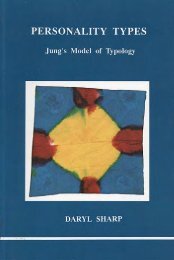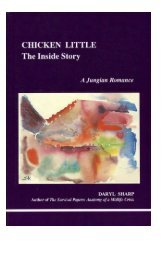Digesting Jung: Food for the Journey - Inner City Books
Digesting Jung: Food for the Journey - Inner City Books
Digesting Jung: Food for the Journey - Inner City Books
You also want an ePaper? Increase the reach of your titles
YUMPU automatically turns print PDFs into web optimized ePapers that Google loves.
18<br />
Toge<strong>the</strong>rness vs. Intimacy with Distance<br />
When a person complains that he is always on bad terms with his<br />
wife or <strong>the</strong> people he loves, and that <strong>the</strong>re are terrible scenes<br />
or resistances between <strong>the</strong>m, you will see when you analyze this<br />
person that he has an attack of hatred. He has been living in<br />
participation mystique with those he loves. He has spread himself<br />
over o<strong>the</strong>r people until he has become identical with <strong>the</strong>m, which is<br />
a violation of <strong>the</strong> principle of individuality. Then <strong>the</strong>y have<br />
resistances naturally, in order to keep <strong>the</strong>mselves apart. 56<br />
One of <strong>the</strong> greatest single obstacles to a mature relationship is <strong>the</strong><br />
ideal of toge<strong>the</strong>rness. It is an ideal based on <strong>the</strong> archetypal motif of<br />
wholeness. Find your soul-mate, your o<strong>the</strong>r half, and you’ll live<br />
happily ever after. This is a very old idea. You find it in Greek philosophy,<br />
<strong>for</strong> instance in Plato’s Symposium, where Aristophanes<br />
pictures humans as originally whole but arrogant. 57 As punishment,<br />
Zeus cut <strong>the</strong>m in half, and now, it is said, we <strong>for</strong>ever seek to replace<br />
our lost o<strong>the</strong>r.<br />
There is nothing intrinsically wrong with this ideal. The mistake<br />
is in expecting to find our “lost o<strong>the</strong>r” in <strong>the</strong> outside world. In fact,<br />
it is our contrasexual inner o<strong>the</strong>r, animus or anima, who is more<br />
properly <strong>the</strong> object of our search. Outer relationships, already hampered<br />
by personal complexes and a multitude of day-to-day concerns,<br />
cannot bear <strong>the</strong> extra weight of archetypal expectations. Although<br />
individuation is not possible without relationship, it is not<br />
compatible with toge<strong>the</strong>rness.<br />
After <strong>the</strong> passage quoted above, <strong>Jung</strong> continues:<br />
56 The Psychology of Kundalini Yoga: Notes of <strong>the</strong> Seminar Given in 1932 by C.G.<br />
<strong>Jung</strong>, p. 7.<br />
57 Symposium, 14-16 (189A-193E).<br />
67










